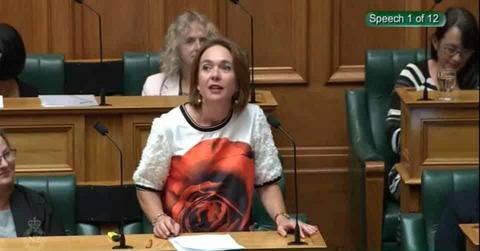New Zealand Passes Bill Allowing Women Paid Bereavement Leave After Miscarriage
New Zealand women who suffer a miscarriage will now be entitled to paid time off for bereavement, thanks to a law that was unanimously approved on Thursday.
With this bereavement bill for miscarriage, New Zealand becomes one of the first countries to offer paid leave after a miscarriage. New Zealand employees will be entitled to receive three days of paid leave after a miscarriage after the law passes its final stage in parliament.
“I can only hope that while we may be one of the first, we will not be one of the last and that other countries will also begin to legislate for a compassionate and fair leave system that recognizes the pain and the grief that comes from miscarriage and stillbirth,” said New Zealand MP Ginny Andersen, who introduced the bill.
Final reading of my Bereavement Leave for Miscarriage Bill. This is a Bill about workers’ rights and fairness. I hope it gives people time to grieve and promotes greater openness about miscarriage. We should not be fearful of our bodies. pic.twitter.com/dwUWINVjLm
— Ginny Andersen (@ginnyandersen) March 24, 2021
Andersen told parliament on Thursday that the grief of miscarriage is “not a sickness, it is a loss, and that loss takes time— time to recover physically and time to recover mentally.”
It’s estimated that 1 in 4 known pregnancies end in miscarriage, according to Tommy’s, and it can take several weeks to recover physically. Those who experience a miscarriage frequently feel guilty, isolated, and alone, studies have shown.
Andersen said she believes the bill will remove some of the stigma that surrounds miscarriage. “I hope that this bill will go some way in allowing women to feel more comfortable about talking about miscarriage and that they feel comfortable reaching out for support and for help in what is a huge physical and emotional loss,” she told lawmakers.
In addition to unanimous support from lawmakers, the law was met with praise on social media Thursday, as social media was flooded with women around the world telling their stories of pregnancy loss.
“I had five miscarriages and only once called out sick after, mainly because I didn’t wanna tell anyone. This will absolutely help some of that stigma,” tweeted Jamie Stelter.
I had five miscarriages and only once called out sick after, mainly because I didn’t wanna tell anyone. This will absolutely help some of that stigma https://t.co/4YYa8bomkP
— Jamie Stelter (@JamieStelter) March 25, 2021
Ishani Nath tweeted a similar story about a friend. “A friend recently shared how painful it was for her to have to go to work the day after her miscarriage,” she wrote. “She hadn’t told anyone about her pregnancy. It was too early. She was devastated by the loss. This type of leave is so necessary.”
A friend recently shared how painful it was for her to have to go to work the day after her miscarriage. She hadn’t told anyone about her pregnancy. It was too early. She was devastated by the loss.
This type of leave is so necessary. https://t.co/qoyO1IW1fC
— Ishani Nath (She/Her) (@ishaninath) March 25, 2021
“Mind-blowing and yet, just plain kind,” Evanne Ní Chuilinn tweeted. “Miscarriage is a silent grief that we still force/encourage ourselves to keep private. Being able to cocoon in the aftermath is a luxury most people can’t afford, or demand.”
Mind-blowing and yet, just plain kind. Miscarriage is a silent grief that we still force/encourage ourselves to keep private. Being able to cocoon in the aftermath is a luxury most people can’t afford, or demand.
👏🏼👏🏼 New Zealand ❤️❤️ https://t.co/NgMTCtIYsp
— Evanne Ní Chuilinn (@EvanneNiC) March 25, 2021
This law follows a number of other women’s rights laws passed in New Zealand in recent years, notably including laws to reduce the effects of period poverty and a substantial bill to ensure pay equity between men and women last year.







